Key takeaways:
- Local business networking focuses on building genuine relationships that foster collaboration and support among professionals in a community.
- Successful networking boosts visibility and can lead to mentorship and opportunities that enhance business strategies.
- Effective event planning requires clear objectives, strong communication, and the collection of feedback to ensure continuous improvement.
- Building lasting connections relies on follow-up, trust, and creating an open environment for sharing experiences and vulnerabilities.
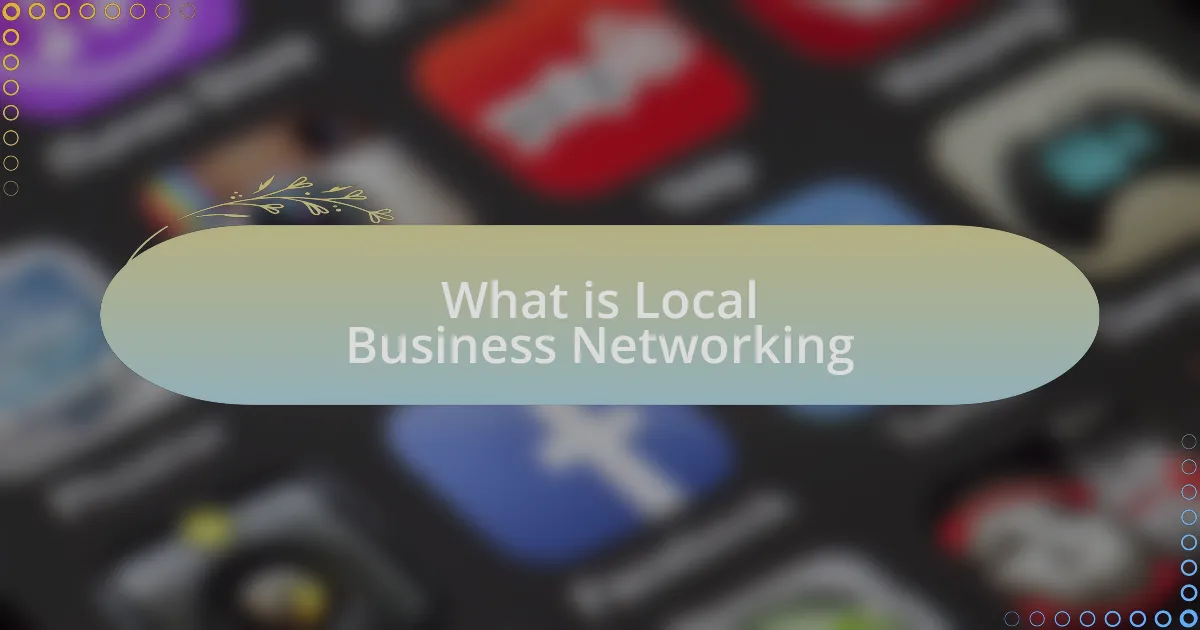
What is Local Business Networking
Local business networking refers to the practice of building relationships among business professionals within a specific area. From my experience, this is not just about exchanging business cards; it’s about creating genuine connections that foster collaboration and mutual support. Have you ever attended a networking event where the energy buzzing in the room made you feel like anything was possible? That’s the magic of local networking.
I remember my first local business networking event vividly. It was an eye-opener, showcasing a diverse group ranging from startups to established entrepreneurs. Each conversation sparked ideas and encouraged creativity, reminding me that collaboration often breeds innovation. Isn’t it incredible how sharing our experiences can lead to unexpected opportunities?
The beauty of local business networking lies in its ability to cultivate a community. It creates a support system where members can share resources, knowledge, and advice. In my case, connecting with others locally opened doors I never thought possible—those relationships have become invaluable. Have you found similar supportive connections in your networking journey?

Importance of Local Business Networking
Building strong local networks can have a profound impact on business success. When I connected with a fellow entrepreneur over coffee, I discovered not just a potential client, but a mentor who helped me refine my business strategy. Can you imagine how empowering it is to gain insights directly from someone who’s already walked the path you aspire to take?
Local business networking also boosts visibility within the community. The more you engage with other businesses, the more likely people will remember you when opportunities arise. I recall volunteering to help organize an event for a local charity; not only did it expand my network, but it also established my presence in a community that values collaboration. Isn’t it rewarding to see your efforts ripple out and create a positive impact?
Moreover, the support you receive through local networks can be a game changer. Just the other day, I faced a challenging business decision, and I reached out to a fellow network member for advice. Their perspective helped me navigate a complex situation and made me realize that I wasn’t alone in this journey. Have you experienced a moment when a simple conversation led to a path forward in your business?
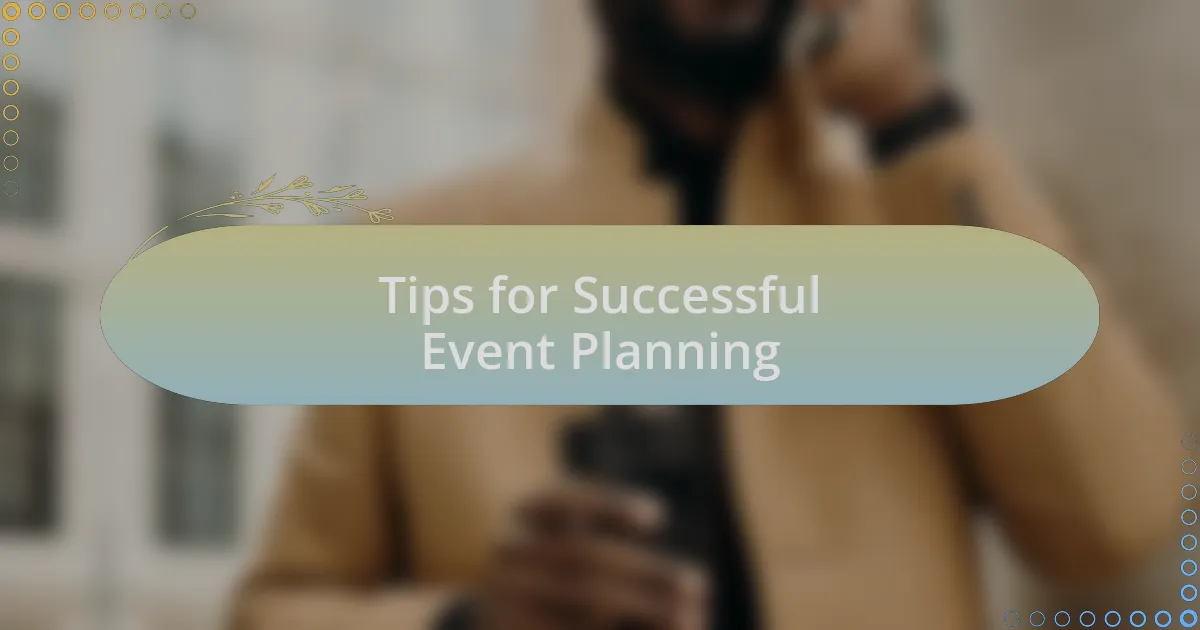
Tips for Successful Event Planning
When it comes to event planning, setting clear objectives is vital. I remember organizing a local craft fair where our goal was not just to showcase vendors, but to create a community experience. By defining what we wanted to achieve from the outset, we were able to create a focused agenda that resonated with everyone involved. Have you ever noticed how clarity can transform an event’s atmosphere?
Another essential tip is to prioritize strong communication with all stakeholders. I learned this the hard way during a recent networking breakfast; some vendors felt out of the loop because we hadn’t updated them on logistics. By maintaining open lines of communication, we fostered collaboration and boosted morale, making everyone feel like a valued part of the team. Wouldn’t you agree that transparency often leads to greater trust among participants?
Lastly, never underestimate the power of feedback post-event. After a recent workshop I hosted, I reached out to attendees for their thoughts. The constructive criticism not only highlighted areas for improvement but also revealed a few unexpected successes that encouraged me to keep pushing my creative boundaries. Do you actively seek feedback after events? I’ve found that listening to others often sparks new ideas and enhances future planning.
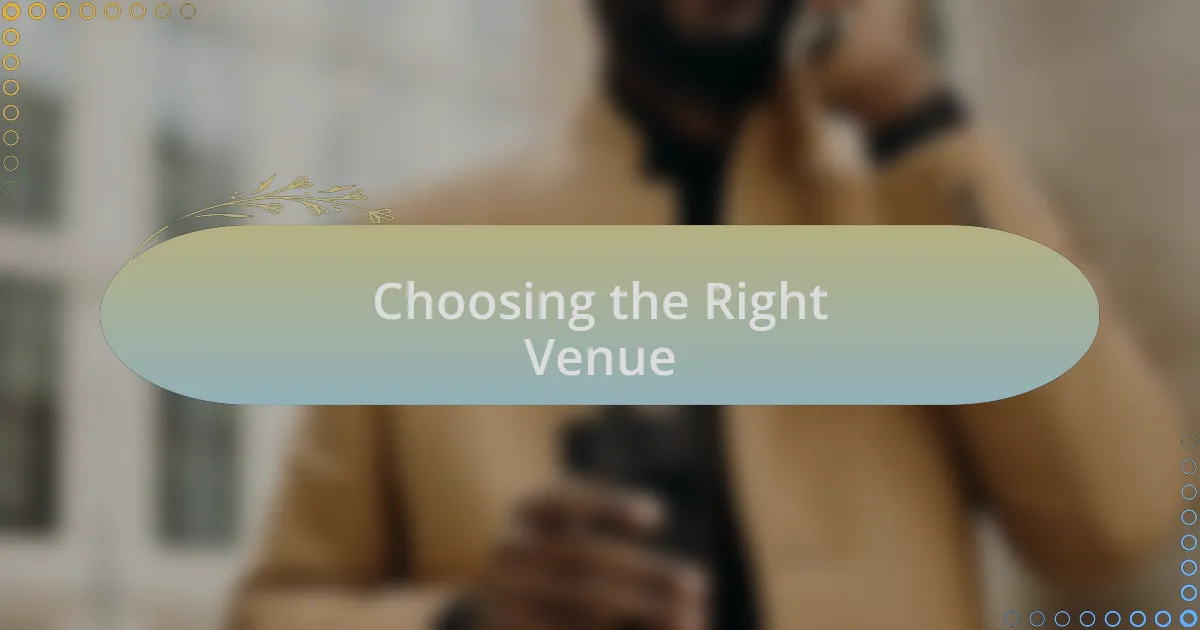
Choosing the Right Venue
Choosing the right venue can make or break your event. I once selected a quaint little bookstore for an author signing, thinking it would create a cozy vibe. However, the lack of space meant several eager fans were left outside, disappointed. Have you ever seen excitement deflate when expectations don’t match reality?
Proximity to your target audience also plays a crucial role. For instance, during a community networking event, I opted for a centrally located café, which proved essential in attracting more local business owners. I still remember the buzz in the air as attendees easily dropped in during their lunch breaks; it brought an energy to the room that was hard to replicate elsewhere. Isn’t it incredible how location impacts attendance and engagement?
Finally, consider the venue’s amenities and atmosphere. I learned this during a fundraising gala at a venue that, while beautiful, had poor lighting that washed out the energy of our presentations. A well-lit space with proper audio-visual equipment can create an inviting atmosphere, enhancing the experience for everyone involved. Wouldn’t you agree that the right ambiance can elevate the entire event?
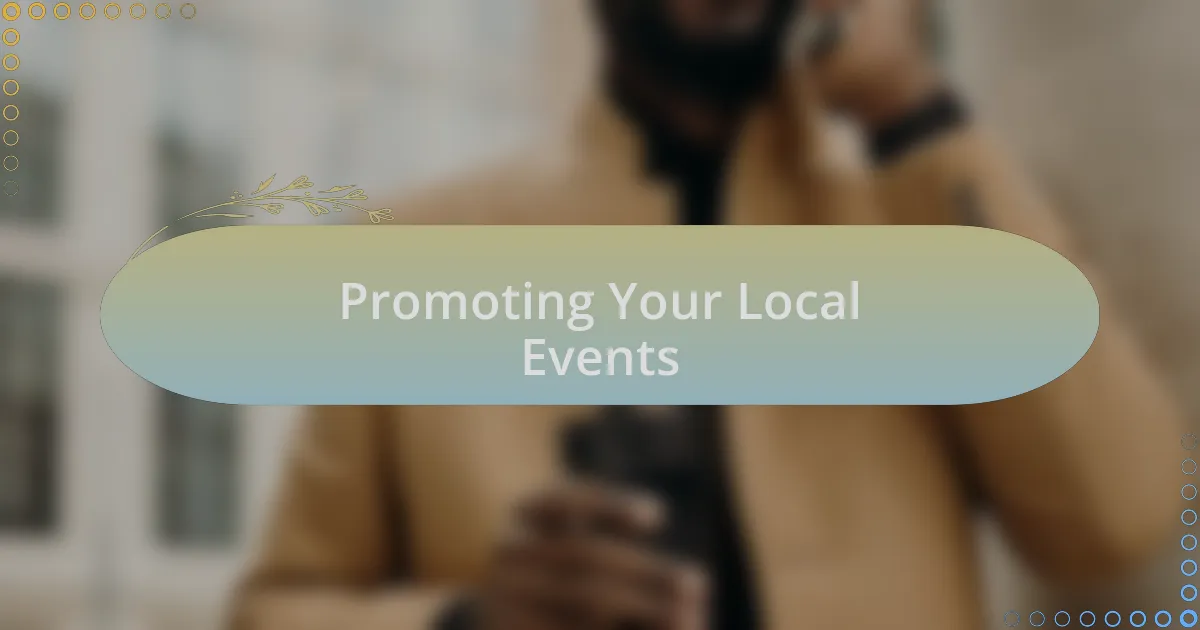
Promoting Your Local Events
Promoting your local events effectively requires a multi-faceted approach. I remember hosting a small business showcase where I leveraged social media and local community groups to spread the word. The excitement of seeing RSVPs rolling in was thrilling; it felt like our collective enthusiasm was drawing in more attendees. Have you ever noticed how a simple post can ignite interest and lead to meaningful connections?
Word of mouth is another powerful tool in your promotional arsenal. At one event, the energy in the room surged when attendees started sharing their experiences on social platforms. Their genuine recommendations created a ripple effect, inviting even more curious locals to check it out. Isn’t it fascinating how personal endorsements can make a bigger impact than traditional advertising?
Don’t underestimate the value of visual content. I created a series of eye-catching flyers for my last networking event, showcasing the speakers and activities. Seeing these vibrant images shared around town was gratifying; they spark curiosity and draw in crowds that might otherwise overlook an event. Have you seen how a great visual can encapsulate the vibe of an event better than words alone?
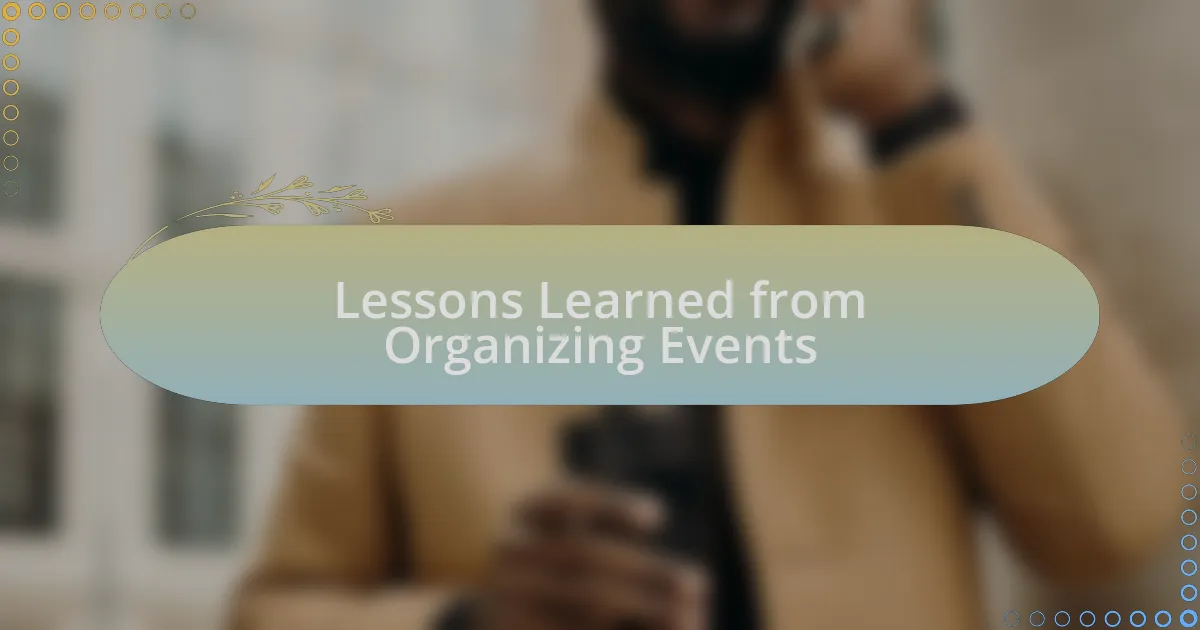
Lessons Learned from Organizing Events
Planning and executing local events has been a real learning experience for me. One of the key lessons I learned is the importance of having a clear agenda and timeline. I recall a situation where we underestimated setup time, leading to a chaotic start that affected the overall flow of the event. It made me realize that a well-organized schedule can significantly enhance attendee experience, making them feel valued and engaged. Have you ever been at an event that felt disorganized? It’s not exactly inviting, is it?
Another insight I’ve gathered revolves around adaptability. I learned this first-hand when unexpected weather forced us to change the venue just hours before an outdoor event. The ability to quickly pivot not only saved the day but also taught us the value of flexibility in planning. This adaptability ultimately fostered a sense of community, as everyone came together to help with the new arrangements. I’d love to hear your thoughts—how do you stay flexible in the face of sudden changes?
Finally, gathering feedback post-event is something I can’t emphasize enough. After my last networking event, I sent out a simple survey asking for suggestions. The responses were incredibly insightful, highlighting areas for improvement that I hadn’t even considered. It was both humbling and enlightening; this feedback loop is vital for growth. Have you ever acted on feedback that completely transformed your approach? Letting attendee voices shape future events not only increases satisfaction but also builds loyalty within the community.
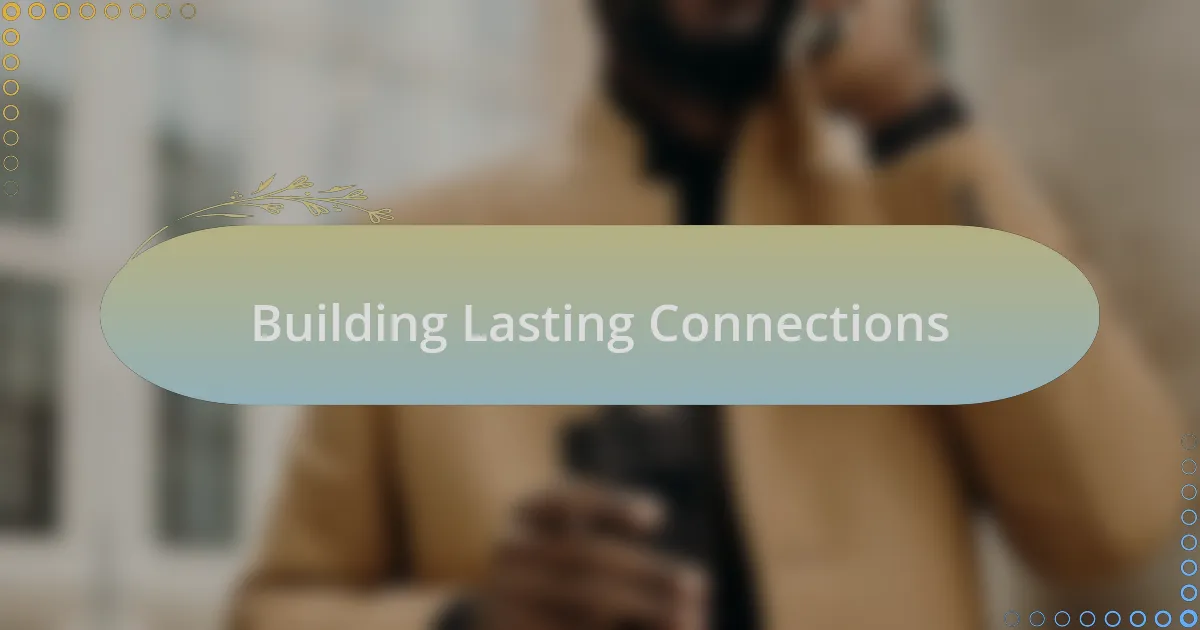
Building Lasting Connections
Creating genuine connections at local events often leads to unexpected friendships and collaborative opportunities. I remember meeting a fellow entrepreneur over coffee during a break at one of my events. What started as a casual chat grew into a partnership that benefitted both our businesses. Have you ever felt that spark with someone you just met? Those moments remind me that conversations grown from shared experiences can blossom into lasting relationships.
To really strengthen these connections, I’ve found that follow-up is key. After an event, I make it a habit to reach out to attendees individually. A quick thank-you email or an invitation to connect on a platform like LinkedIn goes a long way. It’s not just about maintaining professional ties; it’s about reinforcing that sense of community. Have you ever reached out post-event and recognized someone’s potential for future collaborations? It can open doors you didn’t even know existed.
Trust is another cornerstone of building lasting connections. During my events, I always strive to create spaces where participants can share their stories openly. Ensuring everyone feels heard nurtures an environment of trust. I’ve witnessed how this openness transforms a group of strangers into a supportive community. What better way to grow your network than knowing you can rely on each other? Sharing vulnerabilities can be powerful, and it’s often the catalyst for deeper engagements.